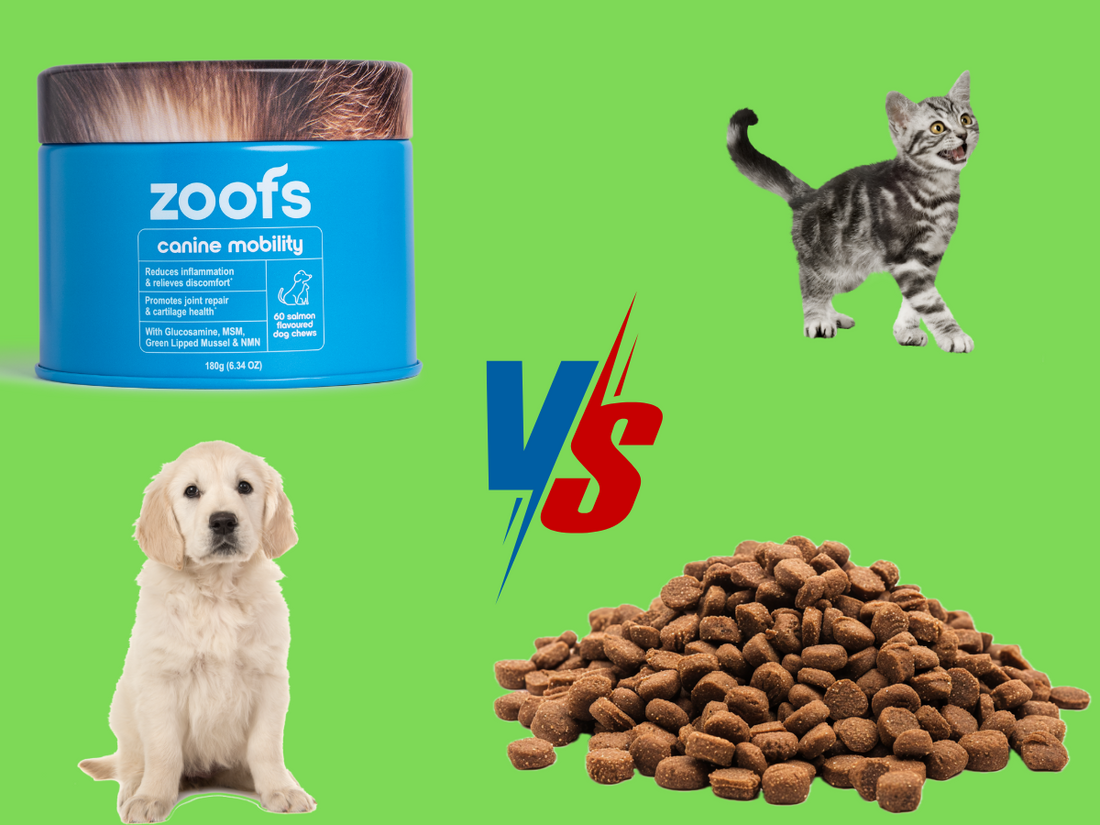
Pet Food vs. Pet Supplements: Why Even Premium Kibble Falls Short
Share
You're spending $80+ on premium kibble, reading every ingredient label, and choosing grain-free, organic options. So why does your pet still need supplements?
The truth is, even the highest-quality pet foods face limitations that make supplementation not just beneficial, but necessary for optimal health.
The Manufacturing Reality Check
Heat Processing Destroys Nutrients Commercial pet food undergoes high-heat processing (called extrusion) that can reach temperatures of 200°C. This process:
- Destroys heat-sensitive vitamins like B-complex and vitamin C
- Denatures proteins, making them less bioavailable
- Eliminates beneficial enzymes and probiotics
- Reduces the potency of omega fatty acids
Shelf Life Requirements Pet food must remain stable for 12-24 months. This means:
- Minimal amounts of fragile nutrients to prevent spoilage
- Heavy reliance on synthetic vitamin premixes
- Antioxidants that may interfere with nutrient absorption
- Processing aids that your pet's body doesn't need
What's Missing From Even Premium Pet Foods
1. Therapeutic-Level Joint Support While some foods contain glucosamine, the amounts are typically:
- Pet food: 100-200mg per serving
- Therapeutic dose: 500-1000mg per serving
Dr. Paddy Casey explains: "The glucosamine in pet food is often just enough to put it on the label, not enough to make a therapeutic difference."
2. Adequate Probiotic Support Most pet foods with "probiotics" contain:
- Pet food: 1-10 million CFU (often dead from processing)
- Effective dose: 1-10 billion CFU of live, active strains
3. Species-Appropriate Omega Ratios Commercial foods often have:
- Too much omega-6 (inflammatory)
- Too little omega-3 (anti-inflammatory)
- Poor quality fish oil that's gone rancid
The "Complete and Balanced" Myth
Pet food labeled "complete and balanced" meets AAFCO standards, which are designed to prevent deficiency diseases, not optimize health.
Think of it this way: a diet of white bread and synthetic vitamins might prevent scurvy, but would you call it optimal human nutrition?
Real-World Example: The Labrador Test
Two identical 5-year-old Labradors:
- Dog A: Premium kibble only
- Dog B: Same kibble + targeted supplements
After 2 years:
- Dog A shows early joint stiffness, occasional digestive upset
- Dog B maintains puppy-like energy, excellent mobility
The difference? Strategic supplementation filled the gaps that even premium food couldn't address.
Which Nutrients Need Supplementing
For Joint Health:
- Glucosamine (500mg+)
- Chondroitin (400mg+)
- MSM (300mg+)
- NMN for cellular repair
For Digestive Health:
- Probiotics (1+ billion CFU)
- Prebiotics (inulin, FOS)
- Digestive enzymes
For Overall Wellness:
- EPA/DHA omega-3s
- Antioxidants (not synthetic)
- B-complex vitamins
The Quality Question
Not all supplements are created equal. Look for:
- Third-party testing for purity
- Therapeutic dosages not "label decoration"
- Natural flavor your pet will actually take
- Human-grade manufacturing standards
When Food Isn't Enough: Real Stories
"I fed Max the most expensive food I could find, but he was still getting ear infections and seemed tired all the time. Adding probiotics and omega-3 supplements transformed his health completely." – Sarah from Auckland
"My vet said Bella's arthritis was inevitable at her age. The premium joint-support kibble wasn't helping. Switching to therapeutic-dose supplements gave her mobility back." – James from Sydney
Making Smart Choices
Continue feeding quality food – it's still the foundation of good nutrition.
Add targeted supplements where food falls short:
- Joint support for dogs over 5, cats over 7
- Probiotics for any digestive sensitivity
- Omega-3s if your pet isn't eating fish regularly
Work with your vet to identify your pet's specific needs based on:
- Age and activity level
- Breed predispositions
- Current health status
- Environmental factors
The Bottom Line
Premium pet food is a great start, but it's not the end of the nutrition story. Just like humans take vitamins despite eating well, pets benefit from targeted supplementation.
The goal isn't to replace good food – it's to optimize nutrition in ways that processed food simply cannot.
Ready to fill the gaps in your pet's nutrition? Our vet-formulated supplements provide therapeutic doses of the nutrients most commonly missing from commercial pet food.


